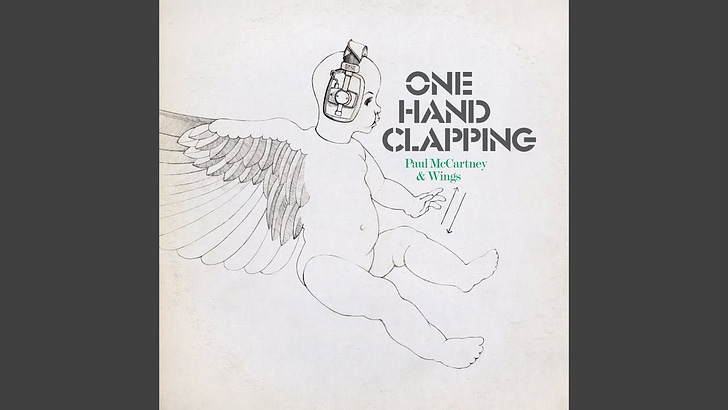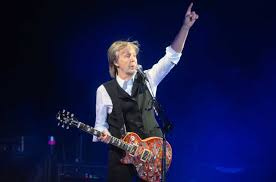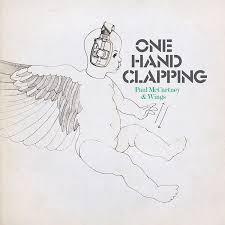There’s no escaping Paul McCartney right now.
This week, when the legendary singer and songwriter finally shares an authorized version of the audio from a 1974 rockumentary called One Hand Clapping, some cultural arbiters will inevitably snipe about how an arbitrary saturation point has been reached. That there’s maybe too much new-old stuff from the Beatles. And Wings. And McCartney solo.
This is not his fault.
The 81-year-old legend is experiencing a strange, likely unprecedented and most certainly time-blurring archival collision.
Audio and visual rarities from his first band continue to surface (see Peter Jackson’s astonishingly nuanced Get Back docuseries, which pioneered a bunch of sophisticated audio restoration techniques). Meanwhile, on a parallel track since roughly 2010, McCartney and his team have been methodically working to enrich the narrative around his second band, reissuing studio records with previously unreleased material. In February, that band’s third album and creative peak, the 1973 Band On the Run, arrived in a revealing “Under Dubbed” mix that stripped out most of the layered instrumental overdubs that gave the original its ornate soundscape.
Not to overlook McCartney’s more recent endeavors: In 2021, he collaborated with Beck and others on expansive and profoundly creative remixes of his 2020 solo work McCartney 3.
The official releases overlap and sometimes coincide, reflecting forward and backward on the timeline. And still they don’t reflect the full sweep of McCartney’s vast, varied, high-volume output.
There’s a special place in Vault Treasures lore for One Hand Clapping. Recorded over four days in August 1974 at Abbey Road while Band on the Run was still at the top of the British charts, it was intended to be a video documentary and, potentially, a live-in-the-studio album. The cameras caught Wings in transition: Denny Seiwell and Henry McCullough had departed just before sessions for Band on the Run started, and their replacements – guitarist Jimmy McCulloch and drummer Geoff Britton – were therefore still relatively new. The band’s sets included crisp, surprisingly faithful versions of current Wings songs (“Jet,” “Bluebird”) as well as Beatles hits and curious covers of old-timey classics (“Blue Moon of Kentucky,” “Baby Face,” which finds McCartney dipping into a delightfully antic W.C. Fields impression).
One Hand Clapping was not officially released at the time. But it was prodigiously bootlegged, in gloriously lo-res portable-cassette-stashed-in-a-suitcoat audio. And as per longstanding Beatles practice, some bits from the sessions surfaced on related reissues – when Band on the Run was remastered in 2010, deluxe editions included the film and audio selections from it.
The 2024 version of One Hand Clapping represents a sonic upgrade to previous iterations, and contains previously unreleased music – most notably a 5-track solo set recorded by McCartney in Abbey Road’s garden on the final day of recording. He’s playing acoustic guitar and singing tunes that fueled his early love for rock and roll – among them Buddy Holly’s “Peggy Sue” and Eddie Cochran’s “Twenty Flight Rock.” (According to legend, that’s the first song McCartney played for John Lennon when the two met in 1957.)
These short performances offer glimpses of an enduring aspect of McCartney’s creativity: His ability to stay loose. There’s no rock star pretention in his “Peggy Sue” – at one point, he abruptly vocalizes the drum part he’s hearing, as though switching from singing words to a flawlessly executed one-measure fill was the most natural thing in the world. He’s clearly having fun throughout “Twenty Flight Rock,” catching Cochran’s twitchy rhythm and sustaining its swing throughout – while jumbling together vocal ticks from Cochran, Elvis Presley and others. There’s so much giddy early-rock energy in McCartney’s version, when he says “Take It, Eddie,” you halfway expect Cochran to dance right into the frame.
This spirit, the simultaneous intertwined sense of reverence and irreverence, animates so much of McCartney’s music – on this discovery, it saturates the campy, lilting music-theater piano of “Nineteen Hundred and Eighty Five” and the insinuating melody of “Jet” and the powerful, gut-punching stomp of a rowdy version of “Hi, Hi, Hi.”
McCartney’s gifting for holding onto stardom loosely while continuing to explore and expand as a musician is something rare to witness in every context where it appears. Here, the backstory is that he’s on the top of the charts again; that clearly doesn’t matter to him. He’s got “A Day In the Life” in his rear view but he’s hardly resting – instead, he’s immersed in making wonderful, strangely melodic music with what now is clearly his second legendary band. (Oh stop, Wings haters: Cure that tiresome bias for good by close-listening to the One Hand Clapping rendition of the intricately episodic masterpiece called “Band on the Run.” We’ve never had a pop song quite like it.)
Like so much of McCartney’s music, this archive release is instructive on a verse-chorus-hook level, impressive on an arrangements-and-orchestration level, and downright inspiring on a human-communication level. The sound of One Hand Clapping is the sound of people not simply playing music, but radiating joy, lightness, love and exuberance all through it.






